Some of you have asked me to change the ‘Persian samples’ page into a bilingual zone. It is a very good suggestion and I agree with that. Now, I am trying to present this page in both Persian and English. Before I start, I want to make something clear from the very beginning. Many of these works you find in the Persian samples page, are somehow the masterpieces of contemporary Persian literature. Maybe, Persian literature will not be able to present such wonderful literary activities once more for generations to come. I am sure, for the rest of its life, our literature is going to miss Nima, Ahmad Shamlu, and many others who imposed a positive and creative revolution on the classical poetry in particular and on our literature in general.
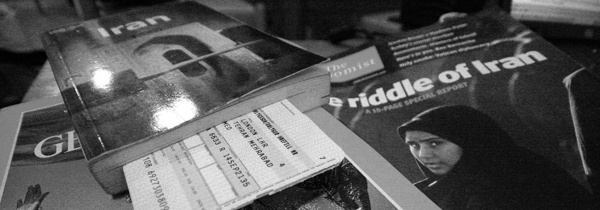 Now, I am asked to translate such everlasting works into English! You see, it’s a very big and frightening duty! However, what I am going to do is providing you with a general explanation and idea that is based on these works. I confess that I am not an expert in this field and my works are really far from the original texts. I am not going to present a word for word translation, as it demands a lot of work. But I am trying to help you get a general knowledge and idea about each work wherever possible.
Now, I am asked to translate such everlasting works into English! You see, it’s a very big and frightening duty! However, what I am going to do is providing you with a general explanation and idea that is based on these works. I confess that I am not an expert in this field and my works are really far from the original texts. I am not going to present a word for word translation, as it demands a lot of work. But I am trying to help you get a general knowledge and idea about each work wherever possible.
I need to beg for forgiveness from our literature for not being so loyal in translating these works, but I do promise and ensure you that I will never ever impose any kind of false theme, interpretation, and idea on these works. You may find the English version at the bottom of this page.
Note: as you see in the following text, there are no symbols (sounds) on or under the letters. We, as beginners, use these symbols during our lessons to learn the correct pronunciation of the words. Later, after you got enough familiarity with the words and the way they are pronounced you would find it redundant to use these symbols with letters, except for some ambiguous words that are not used very often.
Bright Horizon by Ahmad Shamlu
The poem reflects a kind of optimism and loyalty. The poet is talking about a day when we will find our doves, a day when kindness will unite (will take the hands of) beauty. A day, when the minimum (least) song is ‘kiss’, and each person is a brother to other person. A day when no one will close the door of his house to others. Locks will be found in the myths (tales) only, and hearts will be enough for living. He is talking about a day when the meaning of each word is love, and nobody will have to look for words to express his feeling. A day when the rhythm of each word is ‘life’, and you will not have to suffer difficulties to compose a poem. A day when each lip is a song, and kiss will become the least song. He ends his work by saying: “a day, when you will come, you will come forever, and kindness and beauty will become equal. A day when we will feed our doves again. And I will be waiting for that day even if I will be no more (to see that day).
Bright Horizon by Ahmad Shamlu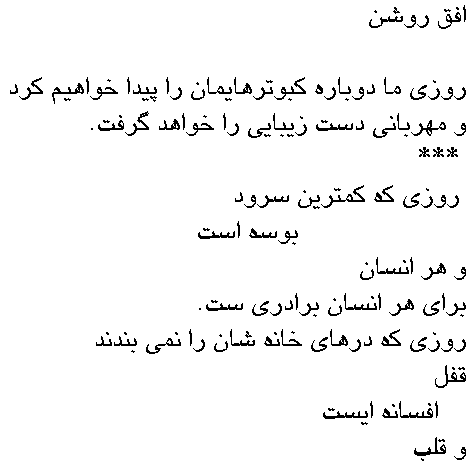
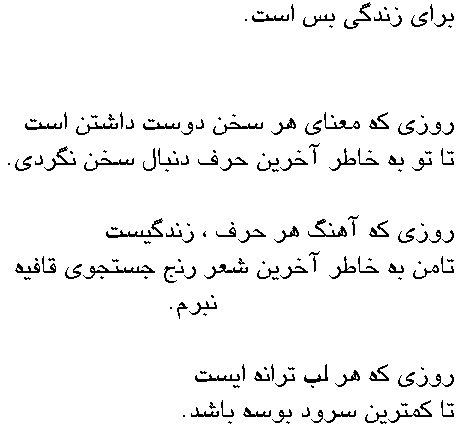
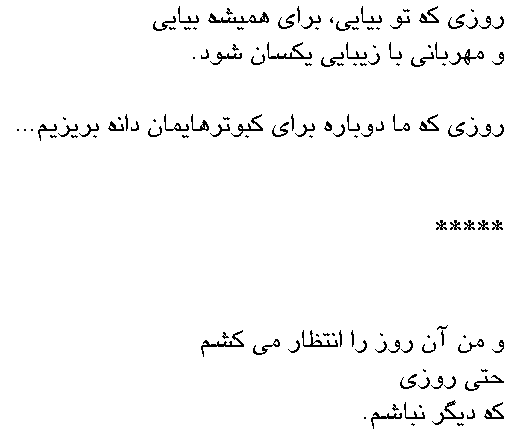
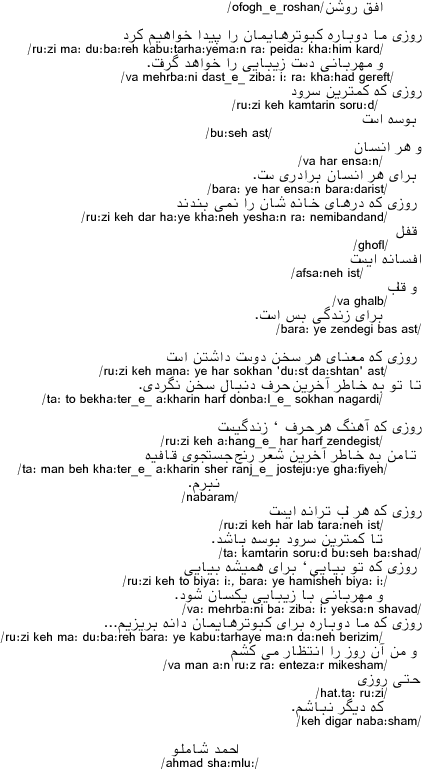
AMIR
May 7, 2012 @ 6:59 pm
thank you for web music persian
Hassan H
May 7, 2012 @ 7:11 pm
You’re welcome!
Scott
May 9, 2012 @ 3:32 am
What a beautiful poem. Alas, I cannot yet read Farsi, but I’m hoping to learn, and your translation and transcription are magnificent. Thank you.
Himanshu
May 14, 2012 @ 1:54 am
Dear Hassan,
I am delighted to find such good source of learning persian.
I am from India (hend) and we have a saying that if one person said something to the other which the other did not understand, then the first person must have talked in Farsi.
Farsi is considered world’s toughest and sweetest language and that’s why i intend to learn it.
I am going to make your lessons as a base and move on. Please suggest how many lessons shall i do in a week. I intend to speak, read and write persian as soon as possible. Please help.
Also, I would like to know, this website is being run by you alone or there is some organizational backing it? You need not answer it if you wish.
Regards
Himanshu
Hassan H
May 14, 2012 @ 10:29 am
Hi Himanshu,
“we have a saying that if one person said something to the other which the other did not understand, then the first person must have talked in Farsi.” :))))))
I don’t know how many lessons you can do every week! That’s not a good question!
Yes, I am running this website. There is no organisation behind me!
best,
Hassan
Sheryl Mendola
May 16, 2014 @ 2:45 am
To dear Hassan
My name is Cheryl I live in United States and have been wonderful studying farsi with you my plan to learn read write and speak Farsi fluidly because I want to come to visit beautiful Isfahan and read the most fascinating poetry and learn all about Irans ancient history thank you for your time and your kindness to making this a magnificent organization that help us from all over the world
maria
May 14, 2012 @ 12:40 pm
In greek, if someone “speaks farsi” means he is fluent, so you can hear people say “he speaks english farsi” meaning “he speaks english fluently” which doesn’t make sense and I don’t know why.. Maybe because to us, persian is an exotic language from far away and someone who is able to speak it appeared talented in learning foreign languages.
Anyway, I have a couple of ideas for the site but I am still in lesson 15 so I don’t know if I am repeating something you have already done later! I like your informal way of teaching, the way you write is friendly, not formal or impersonal. And you explain everything as if it is for dummies which is very wise because everyone thinks differently and what is clean to one is difficult for another, especially with so many cultural backgrounds.
So, I was thinking of lessons with themes, like “telling the time” where we learn how to ask, read and tell the time, or “giving directions” or “ordering food at a restaurant”etc. Also, some tests every 10 or 20 lessons, like we do at school where we fill gaps withought knowing the answer and then we press a button and see our scores! Also, links to nice modern and traditional songs on youtube or else like this یاد باد – سالار عقیلی or Shahin Najafi, Ranandegi Dar Masti or سالار عقیلی – مدامم مست . Of course everyone’s taste in music is different but some of them are classic and I have no idea what they say but they make my soul float on air on a persian carpet! :) And I would never have heard them, if I hadn’t met an iranian friend, which also taught me how kind and peaceful these people are.
that’s all. I have found an application on google chrome to type persian with english characters and persian appear, and a persian heyboard here:www.lexilogos.com/keyboard/persian.htm
Hassan H
May 15, 2012 @ 9:16 am
Thanks Maria.
Will see what I can do regarding ‘telling the time’, ‘giving directions’ …
(but can’t promise! because I’m very busy now – maybe in the future).
Thanks again and wish you best,
Hassan
Rabie
May 14, 2012 @ 3:45 pm
Hi Hassan! I know Dari and farsi (my parents talk) but I am not good to write it, I live in Norway and write Norwegian(bokmål) and english all the time.. So, I justwonder if you could give me some advise, because I have a test on dari/Farsi at the school soon ..:)
Regards
Rabie
Ines
June 10, 2012 @ 7:38 am
just to say thank. Wonderful tool you’ve made for learning Farsi.
Mazyar
June 11, 2012 @ 4:41 am
Hi Hassan,
My name is Mazyar. I’m a 16 year old guy who is half Iranian and would like to surprise my grandmother for her next birthday by speaking some Farsi. Your website is wonderful and very detailed and I am learning a lot. My only concern is that my uncle told me that “Anha” is used in literature rather than spoken Farsi and that “Una” is used in spoken Farsi.
1) Is this true?
2) If so, would you conjugate a verb in the same way using “Una” and “Anha”?
Cristina Jiménez (@cjimenezl)
July 11, 2012 @ 8:30 am
This web page is a treasure! I’m glad that I found it!
Best regards from Mexico,
Cristina
Fizza.
August 19, 2012 @ 3:06 am
Thank you so much for these lessons!
I have been through the first 9 lessons and thanks to my studies in Urdu I found them slightly easy. In Pakistan we are taught to read, write and converse in Urdu and I remember reading in a text book that Urdu is a mixture of certain languages which includes Persian/Farsi, hence they are very alike. The pronunciations are difficult though, I love how you have provided so many audios so that no one gets it wrong, it shows your love for your language which is very admirable.
I wish to learn Persian so I can read Persian poetry for itself and not the translations, however good, they can possibly not contain the same essence in them.
Best wishes for your project :)
Fizza.
Kay
August 22, 2012 @ 11:08 pm
The poem is very nice. I really liked the sentiment it expressed.
Shoriful Islam
August 29, 2012 @ 1:13 pm
Admin, Thank you so much for creating this site.
Danika
September 25, 2012 @ 2:43 pm
Thank you for this precious gift. I love the meaning of the poem, and look forward to being able to know Farsi more than I do.
M.K.Sherwani
October 30, 2012 @ 7:44 pm
Hello! I am familiar wuth the Farsi script and I can read Urdu fluently. Which lesson should I begin. I went from lesson to lesson 9 very very quickly. so please make it easy for me by telling me my entry level lesson.
Regards,
Sherwani
M.K.Sherwani
October 30, 2012 @ 7:50 pm
Hello again!
Where can I find an English/Urdu/Hindi translation of “Oofagh-e-Roshan”? Not a generalised translation as given in the lesson but a literal, word-by-word translation.
Please help.
Regards,
Sherwani
Afshin
November 7, 2012 @ 10:28 am
I try to translate it in english . i hope it will help you
The bright horizon افق روشن
Someday we will find our pigeons روزی ما دوباره کبوترهایمان را پیدا خواهیم کرد
And kindness will “take the hand” (help) of beauty و مهربانی دست زیبایی را خواهد گرفت
The day that the least song is the kiss روزی که کمترین سرود بوسه است
And every human و هر انسان
For any human is a brother برای هر انسان برادری است
The day that they will not shout their home’s doors روزی که درهای خانه شان را نمی بندند
The lock قفل
Is a legend افسانه ایست
And the heart و قلب
Is enough for living برای زندگی بس است
The day that the meaning of every speech is loving روزی که معنای هر سخن دوست داشتن است
So you don’t have to search speech for last word تا تو به خاطر آخرین حرف دنبال سخن نگردی
The day that melody of every word is life روزی که آهنگ هر حرف زندگی است
So I don’t suffer to find rhythm for last poem تا من به خاطر آخرین شعر رنج جستجوی قافیه نبرم
The day that every lip is a song روزی که هر لب ترانه ایست
So the least song be a kiss تا کمترین سرود بوسه باشد
The day you come , for ever you come روزی که تو بیایی برای همیشه بیایی
And kindness will be equal to beauty و مهربانی با زیبایی یکسان شود
The day that we will throw seeds for our pigeons روزی که ما دوباره برای کبوترهایمان دان بریزیم
And I am waiting for that day و من آن روز را انتظار میکشم
Even the day حتی روزی
that I don’t exist anymore. که دیگر نباشم
rasheman
May 11, 2014 @ 6:10 pm
ur translation khaily umde w sahal w dilpazir thanx
nuzhat
April 12, 2013 @ 2:39 pm
thank you!
nuzhat
fahad mehmood
July 11, 2013 @ 11:54 am
thank you so much for translation . it’s wounderfull job you are doing i’m learning very easly beacause i’ve already grip on urdu language .
nazish hassan
November 21, 2013 @ 5:47 am
learning farsi is my dream.Thankyou so very much of creating such an easy n nice useful site, jazak allah:)))))))))))))))))).
Nenad
December 29, 2013 @ 12:55 pm
thank you for your energy and time to create this page, it is nicely explained
Sreemoyee
February 2, 2014 @ 5:19 pm
This is so helpful. I’m just a beginner, and you just made reading Shamlu in Persian happen for me. Feeling awesome :)
Pauline
February 23, 2014 @ 10:46 pm
Thank you for your contribution. I learnt a little Farsi many years ago but have decided to start over and do better. I find your site very helpful. Thank you so very much.
Azeez
June 4, 2014 @ 4:09 am
Hi,
Can you include poetries from Amir Khusro with translations ?
Ashley
June 4, 2014 @ 7:07 am
Hello Hassan,
Greetings! Thank you for sharing your beautiful website with us, really glad that I found it. What a treasure! :) I am very interested in learning Farsi, and hoping to learn it soonest. :) I am just a newbie here and definitely don’t know where to start? Please give me an advice.
Thank you very much. :)
Ashley
Bahar
June 17, 2014 @ 3:22 am
Dear Hassan,
I truly appreciate this detailed database for Farsi. You not only include tedious instructions for understanding/writing of the language, but also include cultural appreciation, such as these Persian samples. I myself can speak Farsi, but being raised in America, I do not know how to read/write Farsi. This website has been extremely helpful to me. Kheyli mamnoon, dastet dard nakoneh.
Best wishes,
Bahar
Nadia Aryaie
October 20, 2014 @ 2:43 pm
Hello .. im from iran ! I am really happy becouse I couldn’t believe those comments .. im really thankful and if some body has a question ,well , it’s my native language ^_^ I will be happy to Help .. this is my Email : [email protected]
Peter Urrea
March 30, 2015 @ 1:30 am
What is letter for “u”???
....
April 4, 2015 @ 12:37 pm
Word ( du:ba:reh ) That is to say the correct pronunciation . Correct pronunciation ( doba:reh ) Is the
Marie
September 3, 2015 @ 6:22 pm
Hassan, thank you for all this. You have made persian easy in a clear way and I hope I will use this language in Iran one of these days!
Marie (in France)
Dr Ahmad
December 5, 2015 @ 5:06 pm
Sir first of all thanks I am an afghan and want to learn dari but I couldn’t found any online resource now I am here my question is whats the difference bw dari and farsi? If I complete a course here will I be able to speak write dari as well
Dr Ahmad
December 5, 2015 @ 5:08 pm
Plus another question I know pashto well and little bit urdu which lesson should I start with?
ZKM
February 11, 2016 @ 8:29 am
I wish to thank you with all my heart for this wonderful website!
Captain Hanan
June 30, 2016 @ 9:42 am
its too nice to have a well lessons about parsi in google thanks alot
Sean
December 28, 2016 @ 2:39 am
It is so delightful to find such a learning resource as you have created as I have always wanted. Thanks for the master piece and hope you can keep updating the contents.
Great thanks.